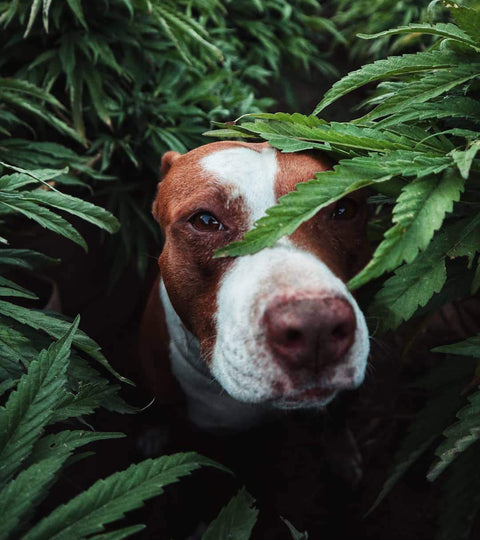Cannabidiol and Your Pets: A Guide to Effective Treatment
In the United States, cannabidiol (CBD) products have become widely embraced because of their ability to safely treat chronic pain, anxiety, insomnia, and other medical conditions. While clinical studies have yet to be conducted on animals, evidence collected from pet owners indicates that cannabidiol can improve health outcomes in pets (e.g. treating pain, reducing inflammation, and helping with sleep). We recommend integrating cannabidiol into your pet’s wellness plan for preventive care because of its positive effects on the immune system and ability to regulate and balance your pet’s body towards homeostasis.
How Cannabidiol Interacts With Your Pet’s Endocannabinoid System
Every animal possesses an ECS, or endocannabinoid system, a series of special receptors that interact directly with cannabidiol when administered. While there are many different types of receptors within an animal’s ECS, the two most widely studied are the CB1 receptors (those concentrated near the brain and central nervous system) and the CB2 receptors (those which exist within the immune system and peripheral organs). Much like a fingerprint, each animal’s ECS is unique, which is why there is a great deal of variability in how pets react to cannabidiol. Pet owners who desire a simple, yet thorough method of monitoring their pet’s response to cannabidiol may wish to consider The Pet Jotter, our newest science-forward journal lovingly crafted in collaboration with our friends at Blooming Culture.

Medical Conditions Treated by Cannabidiol
Pet owners have utilized cannabidiol as a treatment for a wide assortment of their pets’ medical conditions, including anxiety, arthritis, seizures, pain, nausea, bowel issues, and inflammation. A recent study of pet owners in Colorado found that 93 percent felt that cannabidiol peformed equally or better than standard care medications or therapies. Although other more traditional treatment options are available, the efficacy and product safety of CBD products has led to their wide adoption.
Choosing the Best CBD Product
When choosing a CBD product for your pet, it is advisable to consider several factors.
- Your pet should never be treated with human-oriented CBD products. Many CBD products targeted to humans have higher potencies than recommended for pets. Additionally, the sweeteners and flavorings in many of these products may produce allergic reactions in pets.
- When deciding on a CBD product, you should note the potency. We recommend that you select products with clear measurements so that you can have an accurate idea of the dose and better determine whether an increase or decrease is necessary.
- It is important to be mindful of the cannabis source used in the creation of the product. The best CBD products for pets are known as “Full Spectrum” or “Whole Plant.” These products are derived from whole plant extractions, meaning that other molecules beyond cannabidiol are likely present in the final product. Whole Plant formulas are preferable to isolates when treating your pet because the additional cannabinoids and terpenes may enhance the efficacy of cannabidiol and generate additional health benefits.
- Extraction method is another factor to consider when choosing a CBD product for your pet. The most common commercial extraction methods for CBD products are CO2 and solvent based. CO2 is both a safer and higher quality extraction method; however, CBD products that utilize CO2-based extraction are typically higher-priced because of the expensive equipment required. Solvent-based extractions use ethanol, butane, or similar substances to extract the desired compounds. While high-grade ethanol extractions (tinctures) may contain terpenes and other cannabinoids, there is a risk that other biproducts of the cannabis sativa plant, including chlorophyll, may be present in the tincture. Butane extractions are best left on the shelf because of the potential risk of leftover solvents remaining in the product.
- It is preferable to purchase products sourced in the United States or Canada. Many CBD products use industrial hemp from Asia that is more heavily processed and may contain additional chemicals.
Administering Cannabidiol to Your Pet
It is best to start slow and work up when introducing cannabidiol into your pet’s holistic health regimen. The average starting dose for a dog is 1 mg per 10 pounds of body weight administered twice daily. For a cat, the average starting dose is 0.5 mg per 10 pounds of body weight administered twice daily. These recommendations should be considered merely a starting point. While some pets may require higher doses for best results, others will respond best to the recommended dose or lower.
If treatment with CBD products is discontinued and then reconsidered, it is important to note that the chemical composition of many cannabinoids change over time. CBD-infused oils, tinctures, and salves for pets have a recommended shelf life of 1-2 years. Beyond that time frame, products may begin to lose their potency and terpene content (if present) and should be replaced.
Summary
Cannabidiol is a non-toxic, non-intoxicating compound that is safe and effective for pets. We recommend using cannabidiol as a daily supplement to maintain or improve your pet’s health outcomes. If your pet is on any current medications, we suggest that you discuss any potential interactions with your veterinarian. In some cases, other medications may increase CBD’s potency or decrease its efficacy.
Eager to maintain your furry friend's health? You can purchase a Pet Jotter by clicking here or learn more about the Pet Jotter by clicking here.
Cover Photo by: @sianazaidAdditional photo by: @SamanthaSensi

